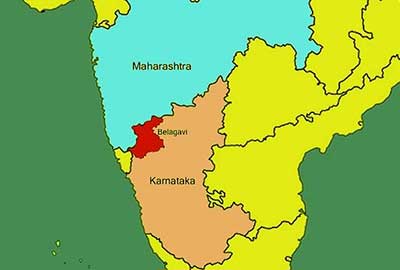Date: 22/12/2022
Relevance: GS-2: Indian Constitution- historical underpinnings, evolution, features, amendments, significant provisions and basic structure.
Key Phrases: Karnataka, Maharashtra, Belagavi, Resolution, Mahajan Commission, Multilingualism, Monolingualism.
Context:
- Karnataka has recently stopped politicians from Maharashtra, including an MP, at the inter-state border when they tried to travel to Belagavi to meet the agitators.
- Pro-Marathi and pro-Kannada groups have started protests, some of which turned violent, responsibility for this lies with the political parties in both states, which have preferred to inflame sentiments than calm tempers.
Key Highlights:
- At the heart of the matter is Maharashtra’s claim over Belagavi, a city with a significant Marathi-speaking population, in Karnataka.
- Belagavi became a part of Karnataka, then Mysore state, when state borders were redrawn in 1960.
- Maharashtra has since been demanding the inclusion of Belagavi and a few hundred villages within its boundaries.
- Maharashtra also rejected the recommendation of the 1966 Mahajan Commission; a panel set up by the Centre and headed by former Chief Justice of India Mehr Chand Mahajan, which ruled in Karnataka’s favour.
Origin of the Problem:
- Belgaum, which was later renamed Belagavi, is located in the northern part of today’s Karnataka and shares a border with Maharashtra’s Kohlapur district.
- During the British Raj, the Belgaum region was part of the Bombay Presidency, which included Karnataka districts such as Vijayapura, Belagavi, Dharwad and Uttara-Kannada.
- Following the implementation of the States Reorganisation Act, of 1956, Belagavi became part of Karnataka, and differences between the state and the neighboring Bombay state – later Maharashtra – erupted.
- In 1957, Maharashtra objected to this and submitted a memorandum to the Ministry of Home Affairs, demanding 2,806 square miles that included 814 villages, and three urban settlements of Belagavi, Karwar and Nippani, to be added to Maharashtra.
Maharashtra’s claim:
- Maharashtra laid claim to Belagavi which was part of the erstwhile Bombay Presidency as it has a sizeable Marathi-speaking population.
- It also laid claim to 814 Marathi-speaking villages which are currently part of Karnataka leading to a decade-long violent agitation and formation of Maharashtra Ekikaran Samithi (MES), which still holds sway in parts of the district and the eponymous city.
- Maharashtra approached the Supreme Court in 2004, challenging the State Reorganisation Act.
What was the Centre’s Response?
- Amid protests and pressure from Maharashtra, the Union government set up a Mahajan Commission under retired Supreme Court judge Justice Meharchand Mahajan on October 25, 1966.
- The commission submitted its report in August 1967, where it recommended merging 264 towns and villages of Karnataka (including Nippani, Nandgad and Khanapur) with Maharashtra, and 247 villages of Maharashtra (including South Solapur and Akkalkot) with Karnataka.
Karnataka’s claim:
- The Karnataka government has claimed Jath taluk in Maharashtra, evoking a strong response.
- He subsequently also claimed that Solapur and Akkalkot regions in Maharashtra belonged to Karnataka.
Arguments of Karnataka:
- Karnataka maintains that the demarcation done on linguistic lines as per the Act and the 1967 Mahajan Commission Report as final.
- Karnataka has resorted to Article 3 of the Indian Constitution arguing that the Supreme Court does not have the jurisdiction to decide the borders of states, and only Parliament has the power to do so.
- However, Maharashtra has referred to Article 131 of the Constitution, which says that the Supreme Court has jurisdiction in cases related to disputes between the Union government and states.
Role of Language
- Language has been central to the formation of social identities; it became a marker of state boundaries only after Independence.
- Languages travelled with traders, craftsmen, missionaries, soldiers, and even clerks, and multilingual societies were created as kingdoms and states were constituted and reconstituted.
- Multilingualism, which has a history of centuries, cross-fertilized the production of literature in Indian languages and the seamless transfer of ideas across linguistic subcultures.
Politics Behind The Border Dispute:
- Elections in Karnataka are around the corner and in recent times, there have been a lot of emerging issues in the state.
- Chauvinist outfits have kept stirring the pot and mainstream parties dip into it whenever they seek a distraction from bread-and-butter governance issues.
Conclusion:
- Maharashtra and Karnataka are relatively new entities while the geographies they encompass have been home to bilingual and multilingual communities and cultures for centuries.
- The rich music, theatre, cinema and literature of both these states have been shaped by the uninhibited mixing of linguistic cultures.
- The warring parties must heed Home Minister, who has appealed to them to wait for a resolution from the Supreme Court, which is hearing a petition on the matter.
- The people who carry the flag of monolingualism are ignorant of both the history and culture of their own states and the country.
Source: Indian Express
Mains Question:
Q. Is linguistic chauvinism the sole reason behind the dispute between Maharashtra and Karnataka over the Belagavi region? Critically Analyze. (250 words).






















